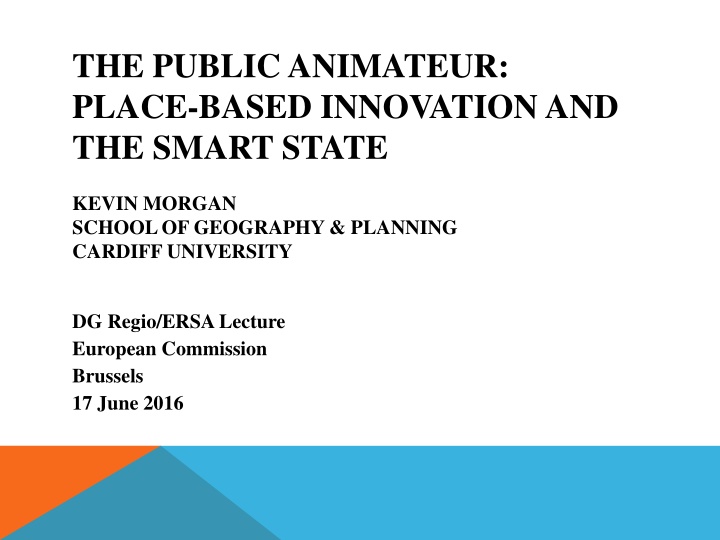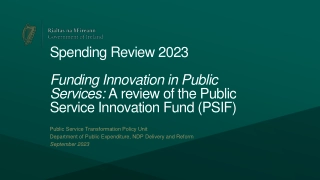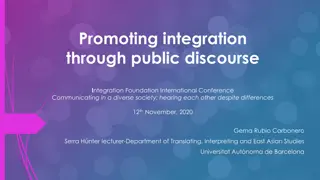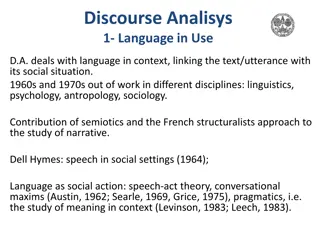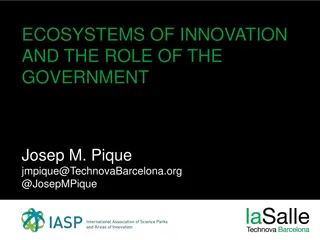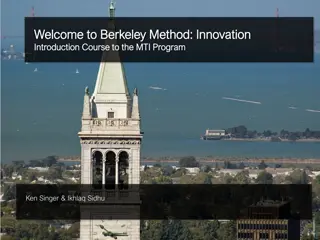The Smart State: Place-based Innovation and Public Discourse
Discussing the concept of place-based innovation, the role of the smart state, and challenges facing the public sector, with insights from Kevin Morgan and Adam Smith. Addressing critiques, including the neo-liberal perspective, and highlighting the need for an entrepreneurial state as proposed by Mazzucato.
Download Presentation

Please find below an Image/Link to download the presentation.
The content on the website is provided AS IS for your information and personal use only. It may not be sold, licensed, or shared on other websites without obtaining consent from the author.If you encounter any issues during the download, it is possible that the publisher has removed the file from their server.
You are allowed to download the files provided on this website for personal or commercial use, subject to the condition that they are used lawfully. All files are the property of their respective owners.
The content on the website is provided AS IS for your information and personal use only. It may not be sold, licensed, or shared on other websites without obtaining consent from the author.
E N D
Presentation Transcript
THE PUBLIC ANIMATEUR: PLACE-BASED INNOVATION AND THE SMART STATE KEVIN MORGAN SCHOOL OF GEOGRAPHY & PLANNING CARDIFF UNIVERSITY DG Regio/ERSA Lecture European Commission Brussels 17 June 2016
OVERVIEW Reprising the state in political economy classical and contemporary conceptions Place-based innovation in Europe the smart state presumption of RIS3 Plight of public sector/lagging regions challenge of lagging regions
STATE DISCOURSE It has become impossible to think straight about the state. The only permissible discourse is to talk of shrinking, fragmenting and privatising it opening it up to competition and market forces. It is accepted as axiomatic that a public institution will be bureaucratic, self-serving and lazy. (Will Hutton, The Observer 18 October 2015)
ADAM SMITH ON THE STATE Arguably the most used and abused thinker in the history of political economy. Little else is requisite to carry a state to the Highest degree of opulence from the lowest barbarism, but peace, easy taxes, and a tolerable administration of justice; all the rest being brought about by the natural course of things. (Adam Smith)
ADAM SMITH ON THE STATE The Wealth of Nations has been misconstrued as a plea for pure laissez-faire. But it is also a plea for a smart state - to temper the noxious effects of the market, social privilege and the division of labour. Apart from peace, security and justice, the smart state was duty bound to promote public works and especially public education.
THE NEO-LIBERAL CRITIQUE Politically based on a zero-sum view of state and market (less of former = more of latter). Theoretically informed by Hayekian insights: Informational: the state cannot be a surrogate for the decentralised information processing capacity of markets. Interventionist: industrial policy will induce rent-seeking, so states cannot and should not engage in picking winners.
THE ENTREPRENEURIAL STATE A recent critique of the neo-liberal critique is Mazzucato s book, The Entrepreneurial State, which aims to: change the way we talk about the state prove the state can be innovative and risk-taking show how the smart technologies of the iPhone were all funded by the state But DARPA is used to illustrate the thesis - a unique mission-driven US defence agency . Underplays the creativity of Apple/overplays the creativity of the public sector.
THE EXPERIMENTALIST STATE The most persuasive critique of the critique is the experimentalist approach (Rodrik/Sabel) the state lacks information, but so does the private sector! firms and states need to collaborate to learn together in a trial-and-error process of social experimentation the aim is to elicit information, find joint solutions, and evaluate outcomes through diagnostic monitoring this is the smart state thesis adopted by Foray and presumed in RIS3
EXPERIMENTALIST GOVERNANCE EG is a recursive process of provisional goal-setting and revision based on learning from the comparison of alternative approaches... (Sabel and Zeitlin). It involves joint goal setting between central and local units where the latter have broad discretion to meet the goals of the project. Projects are subject to a continuous process of diagnostic monitoring - the primary aim of which is to build problem-solving capacity not to police compliance. Sabel argues that RIS3 needs more diagnostic monitoring or it could degenerate into business as usual.
BARRIERS TO EXPERIMENTALIST STATE EG is compelling in principle but challenging in practice because... Feedback is critical - but stymied by fear, power and hierarchy. Failure is not tolerated - but the public sector is invited to be more experimental and less risk averse. Learning is vital but time and space are not afforded to monitoring, evaluation and revision.
REGIONAL INNOVATION POLICY Regional innovation policy is 26 years old and its effects remain ambiguous, like Cohesion Policy more generally - One of the major challenges for EU Cohesion policy is that, after 25 years of implementing the policy, the evidence for its effectiveness is so inconclusive. Academic research and evaluation studies have reached widely differing conclusions on the results of interventions through Structural and Cohesion Funds. (Bachtler et al, 2015)
SHARE OF INNOVATION-RELATED INVESTMENT IN EU COHESION POLICY Programming Period Programming Period % % Value ( Value ( bn bn) ) 1988 1988- -1993 1993 4 4 2 2 1994 1994- -1999 1999 7.6 7.6 7 7 2000 2000- -2006 2006 11 11 21.5 21.5 2007 2007- -2013 2013 25 25 86 86 2014 2014- -2020 2020 45 45 166 166
HYPER-FAST POLICY RIS3 concept has been rapidly embraced by the EC, OECD and the World Bank. Described as the brilliant career of a relatively simple idea...produced at the right moment (Foray). EC support helped the concept to avoid the fate of being buried in the great cemetery of good ideas that were never tested or applied (Foray). No pilot actions for RIS3 - the biggest innovation policy experiment in history.
SMART STATE PRESUMPTION RIS3 presumes the existence of a smart state because it asks a lot of the regional state and other public bodies (eg universities). Key aspects of the smart state include: quality of government public sector competence public procurement capacity entrepreneurial discovery process responsive political elites committed to innovation
QUALITY OF GOVERNMENT INDEX Poor governance can stymie innovation and economic growth and trap regions in a low growth equilibrium. Poor governance makes for poor and unresponsive public services. Poor governance is cause and consequence of fraud and corruption. Poor governance compromises the impact of Cohesion Policies as it reduces absorptive capacity.
ABSORPTIVE CAPACITY Absorption of Cohesion Policy funding and Government effectiveness, 2014 1.5 1.5 WB Government effectiveness index, 2012 standardised so that EU=0 1.0 1.0 FI DK SE NL 0.5 0.5 LU BE UK ATIE DE CY FR MT PT 0.0 0.0 ES SI LTEE CZ LV SK PL HU -0.5 -0.5 IT EL BG -1.0 -1.0 RO -1.5 -1.5 40 50 60 70 80 90 Total absorption rate of Cohesion Policy funding 2007-2013 by 21/05/2014 (%) Source: World Bank and SFC
PUBLIC SECTOR COMPETENCE Public procurement accounts for nearly 20% of EU GDP and has untold potential to effect social/economic/ecological change. But it is the biggest source of irregularities in EU regional policy and this weakens the power of public purchase. The academy has done too little work on the scope for/barriers to the power of purchase.
PUBLIC PROCUREMENT GUIDE Low cost still dominates the practice even though the guidelines allow public bodies to seek values for money and not just value for money. Power stymied by poor skills and low political commitment. of purchase is Public procurement is the sleeping giant of regional innovation policy.
ENTREPRENEURIAL DISCOVERY The core of RIS3 (for Foray) is the process of entrepreneurial discovery in which the smart state identifies new R&I priorities alongside firms and universities etc. But many regions still cling to the linear model of innovation in the (mistaken) belief that university research inputs = innovation outputs. Big disconnect here with the academy, where the linear model was buried over 20 years ago What can be done about university science silos?
REGIONAL ELITES/USUAL SUSPECTS RIS3 needs to address under-performing elites because they correlate with low QoG innovation Need to hold elites to account through local and extra-local means: through local civil society (eg the Integrity Pacts pioneered by Transparency International). through national/supra-national conditionalities (eg the ex-ante conditionality of RIS3). the double movement Barca formula for place-based development.
EVISCERATED PUBLIC SECTOR Many governments in thrall to a pre-Keynesian creed that aims to eliminate the deficit and shrink the state. A shrunken state is a disempowered state that lacks the capacity to offer smart state solutions Public sector becoming more important to innovation in sectors health, social care, education, energy, transport, agri-food, built environment that contribute to smart, sustainable and inclusive growth. Third wave innovation needs a smart state
PUBLIC SECTOR IN LAGGING REGIONS Lagging regions are the biggest challenge to Cohesion Policy and the smart state presumption. Cohesion policy trends from infrastructure to innovation and from absorption to results etc - are very challenging for lagging regions. Quality of institutions and calibre of networks are critical to the success of RIS3. Credibility/legitimacy of the state needs to be enhanced - by curating the RIS3 process not controlling it especially in lagging regions.
LAGGING REGIONS The Lagging Regions project presumes a smarter public sector because it aims to foster knowledge triangle linkages in 2 types of lagging region: low growth regions in Southern Europe underdeveloped regions in CEE countries Case of North East Romania: lack of regional powers lack of university engagement EC projects (like P2P and HESS) can help, but devolution of power is key to the valorisation of local knowledge
STATE AS CURATOR Public sector must play a more catalytic role in RIS3 process. By using its convening power to broker new networks within the region (to promote triple and quadruple helix partnerships). By using its curating capacity to foster trans-regional networks and value chains (like the Vanguard Initiative). Smart states are valued for their competence in the network not for their status in the hierarchy (and for deploying soft power as well as hard)
SUMMARY Smart states can make a big difference to innovation and development (if they have the institutional capacity/political leadership). RIS3 presupposes a smart state but latter is far from the norm (and public sector innovation is stymied by lack of feedback, learning and fear of failure). Shrinking the state is counter-productive as a (smart) public sector is a key actor in the era of place-based innovation and societal challenges especially in our lagging regions.
